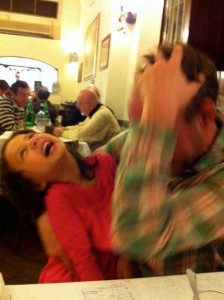 Have you ever wished you could see inside your child’s brain? Not with a hacksaw and a sheet of curved plastic—I mean, anyone can do that. What I’ve always wanted was to watch it tick, to see little 3-year-old Sasha’s brain make new connections, to finally crest each hill of understanding. As it is, we have only limited, indirect evidence to rely upon, but even that can be fascinating.
Have you ever wished you could see inside your child’s brain? Not with a hacksaw and a sheet of curved plastic—I mean, anyone can do that. What I’ve always wanted was to watch it tick, to see little 3-year-old Sasha’s brain make new connections, to finally crest each hill of understanding. As it is, we have only limited, indirect evidence to rely upon, but even that can be fascinating.
Case in point: In the last month or so, Sasha has suddenly become much more capable of understanding narrative. She watches entire movies—My Neighbor Totoro and Kiki’s Delivery Service are on endless repeat these days—and when you ask her questions about them (“Why is Kiki sad?”), she can attempt reasonable answers. It’s sort of incredible that she can hold all these things within her head and attempt to figure them out.
While in Italy, I put this new understanding to the test: Instead of reading her bedtime stories, I began to make them up. There was one story about a princess who would only wear pink, and another about Pinocchio, but most of them were about Daddy’s valiant attempts to find and warm up milk for his daughter Sasha. Mountains were climbed, moons lasso’d, rocket ships built and launched, all so that the fictional Sasha will have something comforting to drink. Each “milky” story, as the real Sasha calls them, ends the same way: Daddy returns, exhausted, and presents the milk to the fictional Sasha, who, after considering this hard-won gift, turns to her father and says, “Daddy—I want juice!”
This ending always occasions much mirth, and it’s rewarding to me to see that she gets the humor—that it’s a joke about her behavior but that, not being real, it’s seen as funny and not a harsh criticism. She laughs, I laugh, this is great.
But then something even more amazing happened. While we were all waiting for a bus on the streets of Rome, Jean and I started bouncing Sasha in our arms and tickling her. This is pretty normal, as was her crazy laughter. But then, in the middle of one fit of insane laughter, she turned to me and said, “Daddy—I want juice!” Then we all laughed, harder than ever, as she said my punchline again and again. Wow. She gets it—she really does. It’s not just that she sees some things as funny, there’s some underlying understanding of humor there—how it works, etc. She can connect things, she can play with context, she can make us laugh. This is great!
But do you know what’s even better than having a smart kid who understand both narrative and humor? Having a kid who’s dumb enough to laugh at my jokes. I’m enjoying that while it lasts.

My daughter, also 3, loves my silly jokes. My 5 y.o., on the hand, is no longer a sure thing as an audience member. So it would seem, fatherhood requires constantly updating one’s act. Kids are a tough crowd.
Vincent | CuteMonster.com
Just wrote a post called Wishing is for Suckers. Take a gander won’t you? Thanks.
http://cutemonster.com/2012/01/wishing-for-suckers/